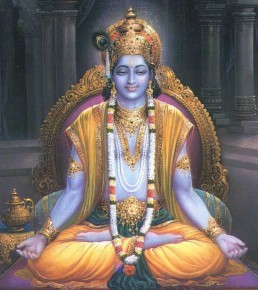Commentary
After eliminating egoism and its manifestations in the form of power, pride, lust, passion and sense of possession the seeker experiences greater peace within as he becomes free from all false evaluations of life.
Swami Chinmayananda
Swami Chinmayananda Commentary
The commentary on this verse and the rest, is avaialble for free as:
Kindle eBook
Google Play Book
Apple Books
Adi Sankara Commentary
Brahma-bhutah, one who has become Brahman, attained Brahman through the above process; and prasanna-atma, [Prasada means the manifestation of the supreme Bliss of the Self as a result of the total cessation of all evils. Prasanna- atma is one who has attained this in the present life itself.] has attained the blissful Self, the indwelling Self; na, does not; socati, grieve-does not lament for the loss of something or the lack of some quality in oneself; nor kanksati, desire. By saying ‘he does not grieve nor desire’, this nature of one who has attained Brahman is being restated. For it does not stand to reason that in the case of a knower of Brahman there can be any hankering for something unattained. Or, (in place of kanksati) teh reading may be na hrsyati, does not become elated. Becoming samah, the same; sarvesu bhutesu, towards all being-i. e., he verily judges what is happiness and sorrow in all beings by the same standard as he would apply to himself (cf. 6.32); but the meaning is not ‘seeing the Self alike in all beings’, for this will be spoken of in (the next verse), ‘Through devotion he knows Me’-; he, the one who is of this kind and steadfast in Knowledge, labhate, attains; param, supreme; madbhaktim, devotion to Me, to the supreme Lord; (he attains) devotion which is described as Knowledge, as the ‘fourth’ in, ‘… four classes of people… adore Me’ (7.16). Then,
The Bhagavad Gita with the commentary of Sri Sankaracharya – Translated by Alladi Mahadeva Sastry
Holy Geeta – Commentary by Swami Chinmayananda
The Bhagavad Gita by Eknath Easwaran – Best selling translation of the Bhagavad Gita
The Bhagavad Gita – Translation and Commentary by Swami Sivananda
Bhagavad Gita – Translation and Commentary by Bhaktivedanta Swami Prabupadha
Srimad Bhagavad Gita Chapter 18 – Verse 54 – 18.54 brahmabhutah prasannatma – All Bhagavad Gita (Geeta) Verses in Sanskrit, English, Transliteration, Word Meaning, Translation, Audio, Shankara Bhashya, Adi Sankaracharya Commentary and Links to Videos by Swami Chinmayananda and others – 18-54

